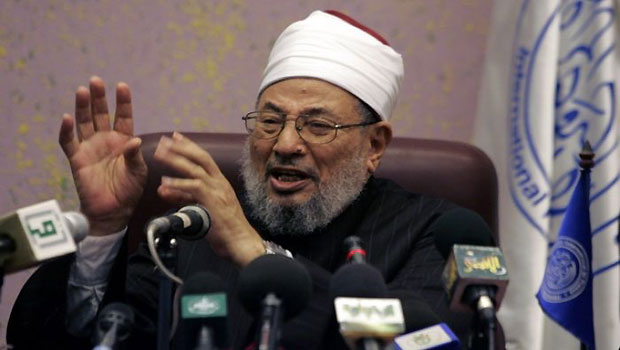Dr. Yusuf Al-Qaradawi criticized the US-led fight against the Islamic State of Iraq and Syria (ISIS) earlier this week. In a tweet, he said: “I oppose ISIS in its ideological path and its methods of action, but I will never agree that the country to fight it should be the United States, which is not motivated by the values of Islam, but by its own interests, even if blood is spilled as a result.”
How are we supposed to understand this position when compared to all the crimes committed by ISIS? Does Qaradawi truly oppose ISIS at all?
How can he oppose ISIS but reject the US-Arab alliance that aims to fight this terrorist group? How could Qaradawi authorize NATO intervention in Libya, but reject intervention against ISIS now? How could he call for international intervention in Syria when he believes that the US “is not motivated by the values of Islam?” Was the international intervention in Libya in line with the values of Islam, according to this rationale?
Therefore, we are facing one of two options here; either Qaradawi is talking about something that he knows nothing about or he wants ISIS to win. When Qaradawi accepted NATO intervention in Libya, he justified this by saying that this intervention was taking place with the approval of the Arab League. Today, the Arab League, the Gulf States and the entire international community—including Iraq—accepts this international alliance to confront ISIS, so what reason does he have to reject this?
In fact, the meeting where the decision to confront ISIS was made was held in Saudi Arabia, so what is Qaradawi’s political or religious justification to reject this alliance? Of course, he has none.
Isn’t it strange for Qaradawi to criticize US attempts to combat ISIS for not being motivated by the values of Islam but rather to serve their own self-interest? This statement was issued at the same time that Iranian Supreme Guide Ali Khamenei criticized the US move to confront ISIS, explicitly rejecting any cooperation with Washington “because they have dirty hands.” However, Iran cooperated with the US to help topple Saddam Hussein, while Tehran also cooperated with the US and NATO in the ouster of the Gaddafi regime. So how are we supposed to understand this double standard?
Therefore, either Qaradawi is talking about things that he knows nothing about, or he is truly seeking to defend ISIS. This could also be motivated by Muslim Brotherhood bitterness towards the US; Washington failed to stand with the Brotherhood following Mursi’s ouster in Egypt. It is important to note here that the Muslim Brotherhood in Jordan have also rejected Amman’s involvement in the anti-ISIS alliance. This is a sign that the Brotherhood may have returned to square one; namely trading on religion and religious issues to bolster their own position and popularity. If true, this is a sign of the group’s political ignorance, particularly as the situation in the region has changed completely. We are now witnessing a general state of complete rejection towards religious extremism—whether Sunni or Shi’ite.
The reality is that it is misinformed and opportunistic statements and discourse that most harm our region and its achievements, whether we are talking about the peace process or counter-terrorism. This typifies the position currently being taken by Qaradawi and the Muslim Brotherhood towards the fight against ISIS.

Mr. Alhomayed is very unfair in his interpretation of Mr. Qaradawi’s position. If the U.S. acts alone, or the U.S. has help from European countries only, and without the full involvement of Arab countries tries to defeat Daesh (ISIL), it is very likely that many Muslims will see U.S. action as a Western attack on the Muslim world. Appearances are very important in moulding public opinion, especially among people for whom access to reliable information is not always possible.
The follows of Daesh (ISIL) are renegades, blasphemers and heretics. Their actions are contrary to shari’ah and the Traditions of the Prophet (peace be upon him). It would be a catastrophe if Daesh is ever able to convince ordinary Muslims that the U.S. (and the West) is waging war against the Muslim oumma. The attacks on Daesh must be seen by Muslims to be justified and necessary from the Muslim point of view.
Unfortunately, Muslim countries with large and capable armies seem very reluctant to help in the fight. They seem to have political reasons for standing aside.
Those leaders, who claim to be Muslim leaders of Muslim people, must stop those who commit the crime of “spreading corruption in the land” and “waging war against Allah and his messenger”. Surely they know that the hadd punishment prescribed by Allah for such criminals is death.